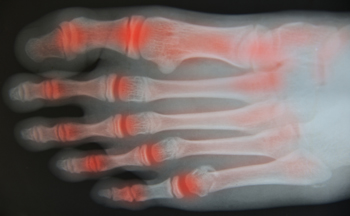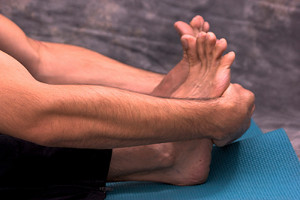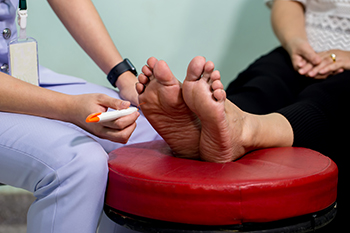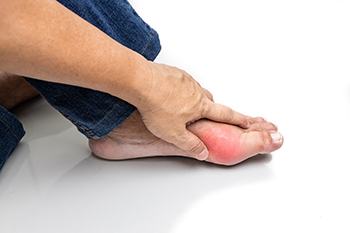November 2023
Early Indicators of Foot Arthritis

Foot arthritis, a condition affecting the joints in the feet, often begins its onset with inconspicuous signs that warrant attention. Persistent morning stiffness, particularly in the feet, can be an early red flag. Individuals may notice increased discomfort during weight-bearing activities or difficulty flexing and extending the foot joints. Swelling and warmth around the joints may accompany these symptoms, indicating inflammation. As arthritis progresses, subtle changes in foot structure or the development of bunions and hammertoes may become noticeable. Gradual limitations in range of motion may hinder daily activities. Persistent pain, even at rest, is another key signal that warrants investigation. Recognizing these initial whispers of foot arthritis allows for early intervention, potentially mitigating the impact on mobility and overall quality of life. If you have symptoms of foot arthritis, it is strongly suggested that you are under the care of a podiatrist who can effectively diagnose and offer treatment and relief options.
Arthritis can be a difficult condition to live with. If you are seeking treatment, contact Dr. Robert Marcus from Foot & Ankle Center of Teaneck. Our doctor can provide the care you need to keep you pain-free and on your feet.
Arthritic Foot Care
Arthritis is a joint disorder that involves the inflammation of different joints in your body, such as those in your feet. Arthritis is often caused by a degenerative joint disease and causes mild to severe pain in all affected areas. In addition to this, swelling and stiffness in the affected joints can also be a common symptom of arthritis.
In many cases, wearing ill-fitting shoes can worsen the effects and pain of arthritis. Wearing shoes that have a lower heel and extra room can help your feet feel more comfortable. In cases of rheumatoid arthritis, the arch in your foot may become problematic. Buying shoes with proper arch support that contour to your feet can help immensely.
Alleviating Arthritic Pain
- Exercises that stretch the foot can prevent further pain and injury and increase mobility
- Most of the pain can be alleviated with anti-inflammatory drugs, heat, and topical medications
- Massages can help temporarily alleviate pain.
It is best to see your doctor for the treatment that is right for your needs and symptoms. Conditions vary, and a podiatrist can help you determine the right method of care for your feet.
If you have any questions, please feel free to contact our office located in Teaneck, NJ . We offer the newest diagnostic tools and technology to treat your foot and ankle needs.
Effective Stretches for Improved Heel Stability

Heel stability is an important aspect of overall balance and comfort, and it is often overlooked until you experience pain or discomfort in that area. Fortunately, there are several stretches that can help enhance heel stability and promote overall foot health. One beneficial stretch is the calf stretch. This simple exercise involves extending one leg behind you and leaning forward with the other, feeling the stretch in your calf and Achilles tendon. By keeping these areas flexible, you reduce the strain on your heel. Another effective stretch is the plantar fascia stretch. To perform this, sit down and cross one ankle over the opposite knee. Gently pull your toes back toward your shin, feeling the stretch along the arch of your foot. This stretch helps to maintain the flexibility of the plantar fascia, thus reducing the risk of heel pain. The final stretch to consider is the toe stretch. This can be done by sitting or standing and extending your toes as far as possible, then curling them under. This exercise strengthens the muscles in your feet and enhances overall heel stability. If you would like additional information about effective heel stability stretches, it is suggested that you speak with a podiatrist who can provide you with the knowledge you are seeking.
Stretching the feet is a great way to prevent injuries. If you have any concerns with your feet consult with Dr. Robert Marcus from Foot & Ankle Center of Teaneck. Our doctor will assess your condition and provide you with quality foot and ankle treatment.
Stretching the Feet
Being the backbone of the body, the feet carry your entire weight and can easily become overexerted, causing cramps and pain. As with any body part, stretching your feet can serve many benefits. From increasing flexibility to even providing some pain relief, be sure to give your feet a stretch from time to time. This is especially important for athletes or anyone performing aerobic exercises, but anyone experiencing foot pain or is on their feet constantly should also engage in this practice.
Great ways to stretch your feet:
- Crossing one leg over the others and carefully pull your toes back. Do 10-20 repetitions and repeat the process for each foot
- Face a wall with your arms out and hands flat against the wall. Step back with one foot and keep it flat on the floor while moving the other leg forward. Lean towards the wall until you feel a stretch. Hold for 30 seconds and perform 10 repetitions for each foot
- Be sure not to overextend or push your limbs too hard or you could risk pulling or straining your muscle
Individuals who tend to their feet by regular stretching every day should be able to minimize foot pain and prevent new problems from arising.
If you have any questions, please feel free to contact our office located in Teaneck, NJ . We offer the newest diagnostic and treatment technologies for all your foot care needs.
How Diabetes Can Affect the Feet

Diabetes is a complex condition that affects various parts of the body, and one often underestimated area is the feet. One of the most common diabetes-related foot problems is neuropathy, which can result in a loss of sensation. Additionally, it can cause tingling, pain, or weakness in the foot. This loss of sensation can lead to injuries that are unnoticed, such as stepping on a tack or developing a blister, which can worsen and become infected. In addition, nerve damage can also alter the shape of your feet and toes, making it essential to avoid wearing ill-fitting shoes. Having high blood sugar levels for an extended period of time can also cause blood vessels in the foot and leg to narrow and harden, inhibiting proper blood flow to the extremities. This poor circulation to the feet makes them less able to heal and fight off infections and can result in the development of ulcers. If left unattended, foot ulcers can turn into gangrene and possibly the loss of a limb. Wearing proper footwear, lifestyle changes, and working closely with your podiatrist are essential steps in managing diabetes and protecting your feet from complications. If you have foot problems that result from diabetes, it is suggested that you make regular appointments to see a podiatrist for checkups.
Diabetic foot care is important in preventing foot ailments such as ulcers. If you are suffering from diabetes or have any other concerns about your feet, contact Dr. Robert Marcus from Foot & Ankle Center of Teaneck. Our doctor can provide the care you need to keep you pain-free and on your feet.
Diabetic Foot Care
Diabetes affects millions of people every year. The condition can damage blood vessels in many parts of the body, especially the feet. Because of this, taking care of your feet is essential if you have diabetes, and having a podiatrist help monitor your foot health is highly recommended.
The Importance of Caring for Your Feet
- Routinely inspect your feet for bruises or sores.
- Wear socks that fit your feet comfortably.
- Wear comfortable shoes that provide adequate support.
Patients with diabetes should have their doctor monitor their blood levels, as blood sugar levels play such a huge role in diabetic care. Monitoring these levels on a regular basis is highly advised.
It is always best to inform your healthcare professional of any concerns you may have regarding your feet, especially for diabetic patients. Early treatment and routine foot examinations are keys to maintaining proper health, especially because severe complications can arise if proper treatment is not applied.
If you have any questions please feel free to contact our office located in Teaneck, NJ . We offer the newest diagnostic and treatment technologies for all your foot and ankle needs.
Complications of Gout

Gout is not only about discomfort. If not addressed, especially when it is ongoing, it can evolve into major health challenges over the years. There are formations called tophi, which essentially are hardened clusters of urate crystals. These can emerge in various areas, including the feet. Even though they might not always be painful, neglecting them can harm your bones, cartilage, and joints. With prolonged gout, individuals often experience regular joint inflammation. This consistent swelling, combined with tophi, can result in permanent joint alterations and rigidity. In extreme situations, surgical intervention might be necessary to rectify or even replace damaged joints. Additionally, gout raises the likelihood of kidney stone formation. This happens because urate crystals can accumulate in the urinary system. Over time, if these stones block your kidneys, it can lead to scarring and damage. There's a belief that this kind of kidney damage, if not treated, can progress to chronic kidney ailments. Moreover, the persistent pain due to chronic gout can be mentally taxing. It can hinder daily activities like walking and working, leading to emotional strain. If you have gout, it is strongly suggested that you make a n appointment with a podiatrist to get treatment for this painful affliction before it takes more of a toll on your body and mind.
Gout is a foot condition that requires certain treatment and care. If you are seeking treatment, contact Dr. Robert Marcus from Foot & Ankle Center of Teaneck. Our doctor will treat your foot and ankle needs.
What Is Gout?
Gout is a type of arthritis caused by a buildup of uric acid in the bloodstream. It often develops in the foot, especially the big toe area, although it can manifest in other parts of the body as well. Gout can make walking and standing very painful and is especially common in diabetics and the obese.
People typically get gout because of a poor diet. Genetic predisposition is also a factor. The children of parents who have had gout frequently have a chance of developing it themselves.
Gout can easily be identified by redness and inflammation of the big toe and the surrounding areas of the foot. Other symptoms include extreme fatigue, joint pain, and running high fevers. Sometimes corticosteroid drugs can be prescribed to treat gout, but the best way to combat this disease is to get more exercise and eat a better diet.
If you have any questions please feel free to contact our office located in Teaneck, NJ . We offer the newest diagnostic and treatment technologies for all your foot and ankle needs.






